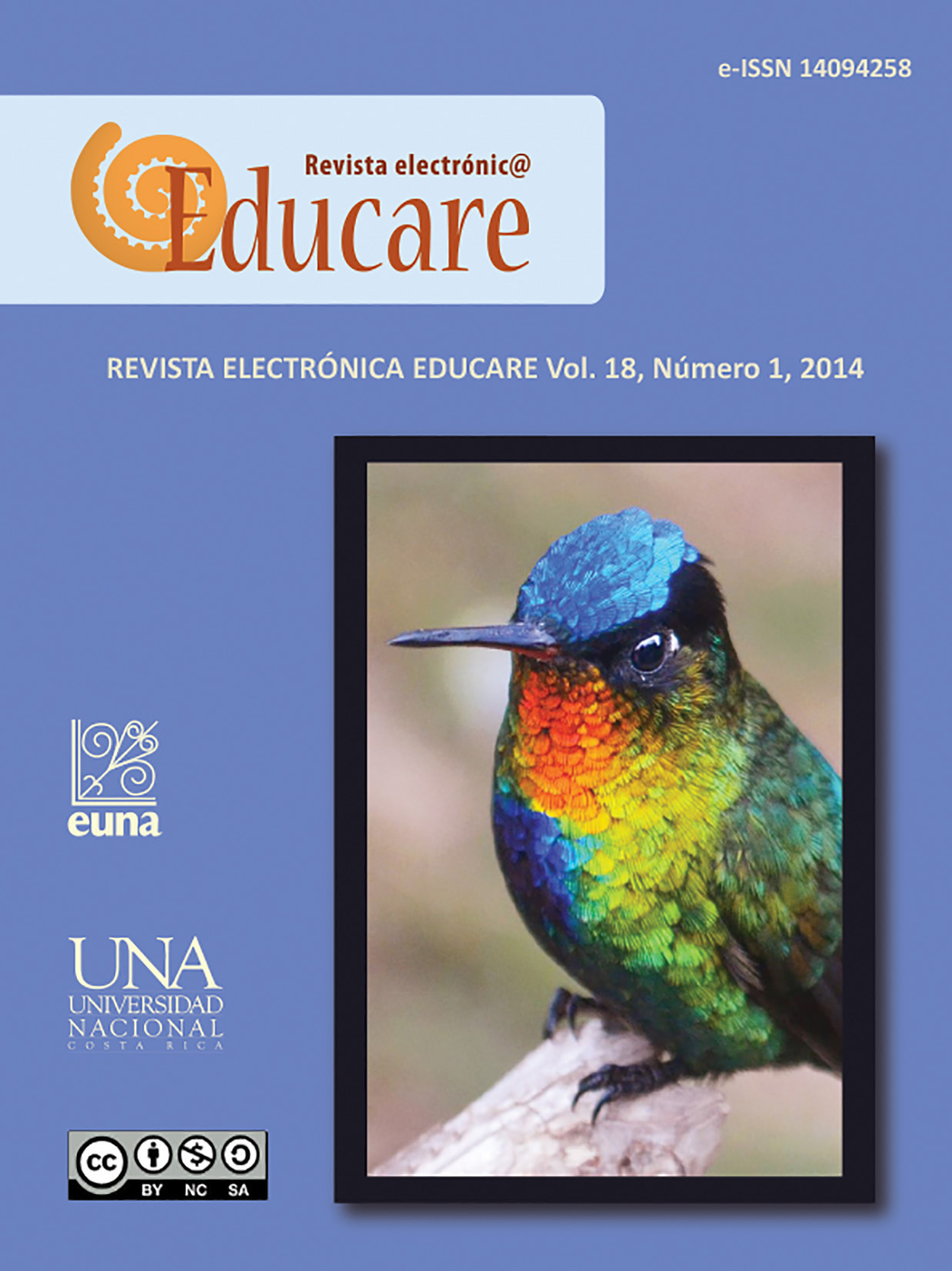Linguistic Competence of Preschool Teachers. An Analysis of Conversational Discourse in Professionals from the Chilean National Board of Early Education (Junta Nacional de Jardines Infantiles)
DOI:
https://doi.org/10.15359/ree.18-1.8Keywords:
Linguistic competences, preschool teachers, conversational discourse, Chilean National Board of Early Education (Junta Nacional de Jardines Infantiles), language development.Abstract
The linguistic competence of preschool teachers are an ongoing referent in the linguistic development of preschoolers since teachers are models for them, because they constantly use oral communication to work, play, and give instructions. Regarding this premise, this paper is aimed at analyzing the linguistic competence of a group of preschool teachers at the lower transition level. Based on the observation of teachers working at the Chilean National Board of Early Education (Junta Nacional de Jardines Infantiles) in the western area of the province of Santiago, a study was conducted regarding teachers’ conversational discourse. It is proposed that higher language skills in teachers promote the oral language development of young children.
References
Acosta, V. y Moreno, A. M. (1999). Dificultades del lenguaje en ambientes educativos: Del retraso al trastorno específico del lenguaje. Barcelona: Masson.
Bruner, J. (1998). Desarrollo cognitivo y educación. Selección de textos por Jesús Palacios (3ª ed.). Madrid: Morata.
Cubero R., Cubero M., Santamaría A., de la Mata, M. L., Ignacio, C. M. y Prados M. (mayo-agosto, 2008). La educación a través de su discurso. Prácticas educativas y construcción discursiva del conocimiento en el aula. Revista de educación, 346, 71-104. Recuperado de http://www.revistaeducacion.mec.es/re346/re346_03.pdf
Dale, P. (2003). Desarrollo del lenguaje. Un enfoque psicolingüístico (9ª reimp.). México D. F.: Trillas.
Echeverría, R. (1997). Ontología del lenguaje (4a ed.). Santiago: Paidós.
Feuerstein, R. (1999). The Theory of Structural Cognitive Modifiability [La teoría de modificabilidad estructural cognitiva]. En B. Presseisen (Ed.), Learning and Thinking Styles: Classroom Interaction [Estilos de aprendizaje y pensamiento: Interacción en el aula]. Washington, DC: NEA Professional Library, National Education Association.
Freire, P. (1973). ¿Extensión o comunicación? La concientización en el medio rural. Montevideo: Siglo XXI Editores.
Gutiérrez, A. y Montes, R. (2004). La importancia de la lectura y su problemática en el contexto educativo universitario. El caso de la Universidad Juárez Autónoma de Tabasco (México). Revista Iberoamericana de Educación. Recuperado de http://www.rieoei.org/deloslectores/632Gutierrez.PDF
Hohmann, M. y Weikart, D. P. (1999). La educación de los niños pequeños en acción. Manual para los profesionales de la educación infantil. México, D. F.: Trillas.
Martínez, L. (1999). El discurso conversacional conceptos y componentes. (Apuntes de clase). Escuela de Fonoaudiología, Postgrado de la Facultad de Medicina de la Universidad de Chile.
Ministerio de Educación (MINEDUC). (2001). Bases curriculares de la educación parvularia. Santiago: Autor. Recuperado de http://www.oei.es/inicial/curriculum/bases_curriculares_chile.pdf
Pavez, M. M., Coloma, C. J., González, P., Palma, S. y Reinoso, C. (1999). El discurso narrativo en niños con TEL. Revista Chilena de Fonoaudiología, 1(2), 17-32.
Peralta, M. V. (1996). El currículo en el jardín infantil. Un análisis crítico (3a ed.). Santiago: Editorial Andrés Bello.
Downloads
Published
How to Cite
Issue
Section
License
1. In case the submitted paper is accepted for publication, the author(s) FREELY, COSTLESS, EXCLUSIVELY AND FOR AN INDEFINITE TERM transfer copyrights and patrimonial rights to Universidad Nacional (UNA, Costa Rica). For more details check the Originality Statement and Copyright Transfer Agreement
2. REUTILIZATION RIGHTS: UNA authorizes authors to use, for any purpose (among them selfarchiving or autoarchiving) and to publish in the Internet in any electronic site, the paper´'s final version, both approved and published (post print), as long as it is done with a non commercial purpose, does not generate derivates without previous consentment and recognizes both publisher's name and authorship.
3. The submission and possible publication of the paper in the Educare Electronic Journal is ruled by the Journal’s editorial policies, the institutional rules of Universidad Nacional and the laws of the Republic of Costa Rica. Additionally, any possible difference of opinion or future dispute shall be settled in accordance with the mechanisms of Alternative Dispute Resolution and the Costa Rican Jurisdiction.
4. In all cases, it is understood that the opinions issued are those of the authors and do not necessarily reflect the position and opinion of Educare, CIDE or Universidad Nacional, Costa Rica. It is also understood that, in the exercise of academic freedom, the authors have carried out a rogorous scientific-academic process of research, reflection and argumentation thar lays within the thematic scope of interest of the Journal.
5. The papers published by Educare Electronic Journal use a Creative Commons License:














 The articles published by Educare Electronic Journal can be shared with a Creative Commons License:
The articles published by Educare Electronic Journal can be shared with a Creative Commons License: 



